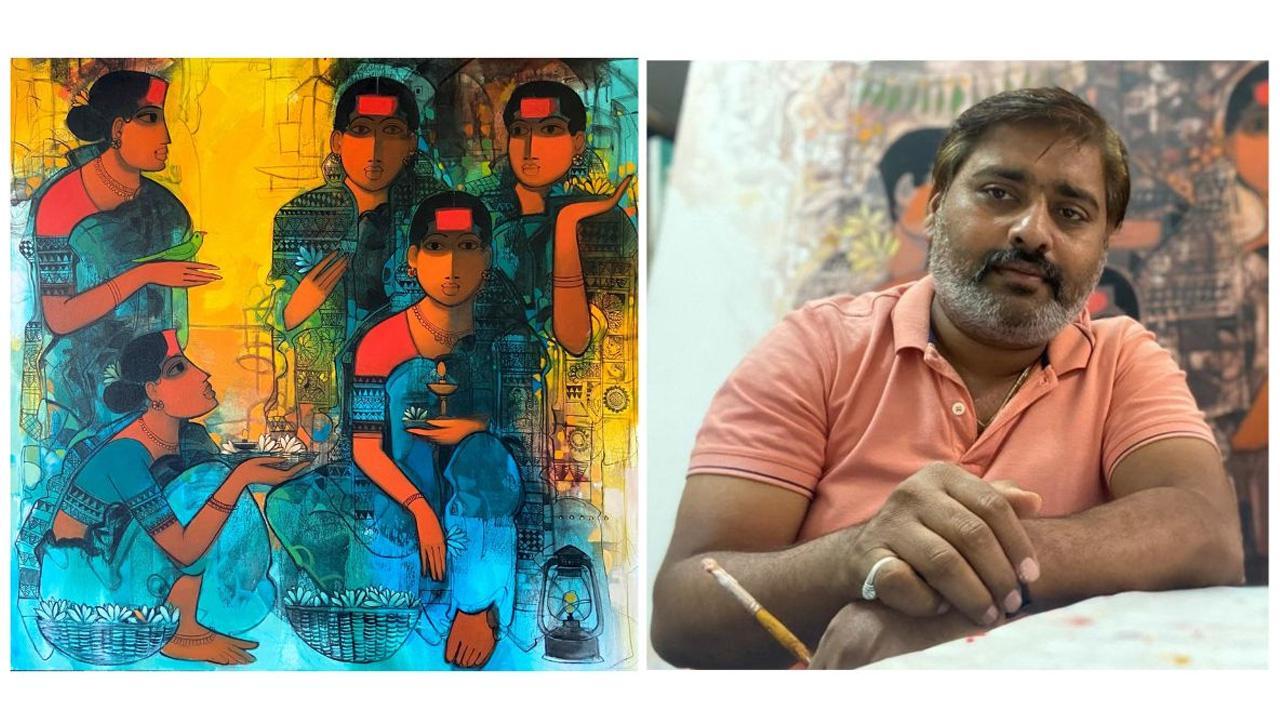These new paintings by Sachin Sagare, like his previous body of work, arrive in a headlong rush of invention festooned upon a canny theme, in this case, the female body in nature.

Sachin Sagare, with his artwork-The Mystery Cult
He places groups of rural women worshippers; he names them as nymphs, dryads and goddesses into clearings in the deep, dark background, thus activating irresistible tropes of an Indian painting tradition meant for royals. A more occult art comes to mind in these unkempt, unruly wildernesses, one which begins with the temple women.
ADVERTISEMENT
The large acrylic paintings in the exhibition swirl chorus of graphically insistent folk women, white blossoms and filigreed stalks that recalls the backyard raptures of rural India. Sagare’s glades are uninhabited; their everyday ecstatic includes luminous beings, spirits of the feminine whose spare, archaic profiles float among the flowers. Faces, flowers, oil lamps and puja-thalis are painted with a kind of folk-art zeal while the cerulean temple walls behind, solidly modelled then dematerialized by dancing layers of sprayed pigment, are appealingly contrary in colour, scale and attack.
Sagare's an experimental approach to mark-making thick or thin, macro or micro, tight or loose, brushed, sprayed or sponged goes for both background and figures. In one of his paintings, a lone woman in a classical pose is incised in green against the mottled background like a fading figure on a krater. Also cut from traditional lines, in this case black, are five hollow women in a mystery cult who seem to be lost, while by contrast, in the other work, the three women protagonists are entangled in a single libidinous squiggle of green and yellow paint that, like flesh to verges on the repulsive. Changing tactics again, Sagare gives the golden apparitions to the three women with an earthy substance. They gesture with a narrative refinement that suggests, along with their warm, coppery tarnish, the microcosmos of an old temple pillar. Sagare, however, putting the brakes on such skilful seduction according to his restless temperament, encloses this exquisite scene in the dark, seething carving on temple panels and walls as brut as the figures are delicate.
Gender critique aside, the paintings are busy, and stop-motion scenography seems like an attempt to do the uncannily naturalistic; his figures form a certain logic to the way followed. The paintings in the show, for that matter, are distinctly re-engineered for function; the small paintings marvellously contain their own charm. A large work rages a preposterously scumbled orange-green, barely contained by the jutting blue and purple forms of super-cooled, super-flat conifers. As in all the paintings, however experimental, internal typology is firmly organized motifs, motifs, figures and oil lamps. In this second large, ravishing version of the theme, the clamorous day has turned into a mysterious night. The precisionist symbolism echoes in Sagare’s crisp and fluorescent canvases, scintillating against a nocturne of blue-violet and black. Yet rogue textures, icky drips, and thorny bumps interrupting the most beautiful passages remind us of art concoction.
The paintings of Sachin Sagare display an overwhelming elasticity to them. Visceral grit, orchestrated by a network of collaged material, weaves its way into more traditional painting language. Elegance is replaced with the subtlety of intrusion and the tenderness of seamless collision. His figures are painted with skins that seem vividly translucent, allowing us to gaze through the stratified layers of paint. Their luminescence seems both coy and purposeful, often serving as the only rational light source.
Sagare manages to excise gender performances from his paintings almost entirely. In this intentional defamiliarization of space, he begins to deflate the omnipresence of normative social structures that forcefully define how and where conventionally feminine bodies are supposed to function. In this way, he prevents us from hijacking the agency of these figures forcing us to read their bodies as texts. Denying conventional legibility and insisting upon the opacity of their own historical narratives.
What I find most intriguing about this work is the way Sagare leans into this obscurity instead of privileging clarity. This playful and, at times, spectacular irresolution plays a significant role in his work. Bodies are refigured as complex ensembles, brilliantly synthesizing the facility of his line, his deft paint handling, and his colour sensibility. A collection of hieroglyphic hands and heads with an elastic relationship to one another and to the spaces they occupy, these robust and curvaceous figures at times aggressively push the limits of the picture plane and at other times are jettisoned into the constellation of body parts strewn about the canvas.
With a firm and confrontational pose, torso twisted around, and eyes focused back onto us and with a full view of his bare behind, the figure entices viewers toward this conceptual edge of the painting, reminding us that our polite curiosity is not to be trusted.
We do not miss the clarity of representational narratives in these paintings. Instead, Sagare presents us with a curious proposition. What if we affirm the unconventional complexity in the bodies of the women folk? What happens to gender if we decenter masculinity and femininity and consider other modes of self–expression, displacing history to freely probe and repurpose the sources of our identity construction? There is no rush to answer these questions here. He instead forces us to sit, wholly attentive and present with every painting. This is encouraging.
VENUE:
Jehangir Art Gallery
161-B, M.G. Road,
Kala Ghoda , Mumbai - 400 001
Timing: 11am to 7pm
Contact: +91 9011251869
 Subscribe today by clicking the link and stay updated with the latest news!" Click here!
Subscribe today by clicking the link and stay updated with the latest news!" Click here!







